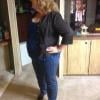Search the Community
Showing results for 'alcohol'.
Found 17,501 results
-


To all ye successful bandsters
FLORIDAYS replied to brannewmee's topic in Weight Loss Surgery Success Stories
I was very strict with myself and I lost 220 lbs in 23 months. I counted every calorie except toothpaste limiting myself to 1000 calories every day. I weighed all my food whenever possible and ate 3 oz protien, 1/2 c veggies or salad and , 1/4 c starch three times every day. I drank more Water then I care to remember and I saw my dr every month without fail. I rarely drank alcohol and cheated less than a handful of times. I didn't exercise except walking which I am not proud of but it's honest. I had plateaus like everyone else but I averaged about ten lbs monthly. I became one with my band and the lesson is now helping me lose a few extra lbs while I am maintaining. I never believed I would not succeed. Getting banded was a drastic decision for me and one I took very seriously. My life depended on it. And the results are amazing.... Because now I am wearing a size 6 and considering I was born a size 14 I am sure... It's an incredible transformation...one that has changed my life. -


Weight Loss Surgery and Self Harm
jess9395 replied to billw0917's topic in Gastric Sleeve Surgery Forums
A report in a scientifically based press source lists the following as areas for follow up studies to look at: "Previously suggested reasons for the association between bariatric surgery and the subsequent risk of self-harm include: permanent changes in body image, diet-related stress and unmet expectations of weight loss, which could increase mental health problems, leading to behaviors such as binge eating, substance misuse and self-harm behaviors. Changes in metabolism of alcohol could play a role, as well as changes in neurohormonal levels, which could lead to depression, addiction and suicide." -
I just had my first alcohol drink 6 weeks after surgery because of the Purim holiday. I'm not an alcoholic, never touch alcohol usually.
-


Confessions
LittleLizzieLilliput replied to Stephanielp's topic in POST-Operation Weight Loss Surgery Q&A
There is nothing off my diet either, the doc said I have no restrictions, even alcohol. But that my diet needs to be protein focused and water heavy. lol! So I have a bite of stuff now and then but in general I'm pretty full and satisfied with my homemade low carb high protein meals. -


Not Sure If This Is An Nsv Or What?
Pookeyism replied to Lissa's topic in Tell Your Weight Loss Surgery Story
Lissa, I "liked" your post - you are very brave and I know going through this is very hurtful. My Sister married an alcoholic after dating two alcoholics. They werent back-toback-to back but I can tell you you are much better off filing for a divorce. Reoccurence in alcoholics is high, and the chances of an enabler changing the situation for an alcoholic is slim. I dated an alcoholic for awhile and we were very serious, until they wrapped their graduation present around an oak tree. It may sound horrible but what if they hadn't? I would have probably spent years and years putting up with an escalating situation that could already get bad at times. I would have never met my wonderful Spouse, left the town I really needed to get out of...you are out, and you see it for what it is. Be brave. Be prepared too. Do what you need to to be protected. Get your handgun license if you don't have it yet. Please don't take offense. I didn't say you needed to get a gun, i just said get the license. The license takes longer, and you don't want to be two or three months out from legally carrying one if you decide you need to. This step, from what I observed with people I knew, can be really hard. This is the physical and spiritual representation of your marriage, and you are going to have to separate all of this out. Be really careful, get a lawyer and email me if you ever need to talk. -
So, I got a text message from my DH last night (and that doesn't mean Dear anything!). Text message said, basically, "File our divorce papers now!" We've been separated since June. I came home from the hospital June 3 on 3 kinds of oxygen. He got ticked because I didn't know what was for dinner that night @@ and broke every dish in our house. I moved out a few days later. I've been doing everything I know how to a. get healthier mentally and physically and b. have even gone to marriage counseling with him, which was useless because he thinks everything is ALL my fault. He's an alcoholic, which he hid from me till after we got married. Now he's in full bloom again. I guess we just weren't meant to be. So, to keep this on topic, can I count this as losing 180 pounds of unnecessary crap in a hurry?
-


Do WLS patients ultimately go back to eating anything?
IncredibleShrinkingMan replied to reachbree's topic in PRE-Operation Weight Loss Surgery Q&A
In a word: yes, but in generally less than one-quarter the prior proportions. I can tolerate anything, and alcohol feels just like it did before. I was frightened by all the stories about one drink feeling like six but that has just not been the case. That said, I am choosing to generally abstain from any beverage but water because I am trying to maximize losing phase. -
I'm glad to hear that you no longer want alcohol. That gives me hope. I actually haven't had a drink for three days and I don't miss it. Keeping my fingers crossed.
-
yes. I had my first glass at least two years out of surgery - and I have a glass maybe three or four times a year. I can feel it pretty strongly after just one glass. Alcoholism runs in my family, so I've always been very careful with alcohol - but now I'm even more so since I know that's a risk of WLS.
-
Well, I'll be honest. I drink a bottle and a half of wine a night. I told my psych and now I'm worried that I'll be refused the surgery. I've read that the doctors might consider alcoholism to be a dealbreaker. I decided to go to AA meetings to try to stop, if that's worth anything as far as surgery goes.
-


Anyone Else Feel Like They Will Suddenly Not Lose Any More?
Parker's Dad replied to Chimera's topic in Weight Loss Surgery Success Stories
That is a big definite yes. I am typing this as a non sleever right now so forgive me. I have really been watching what I eat, when I eat, etc for a long time now and have been on a slow drop for a while. We started the Biggest Loser at work a couple weeks ago and I have dropped a good bit. As I weighed in yesterday morning, I realized that I have hit the weight that I stalled at 4 years ago. That was THE STALL OF ALL STALLS!!! I am not kidding at all. I had been watching everything I ate, I was jogging between 9-18 miles a week, no alcohol, NOTHING!!! I tried changing up my diet, my exercise, fluids, Protein up/down, carb cycling, detoxing, colon cleanse, fasting, increasing calories, you name it and I did it and I could not budge off of 315. I have been doing great the last couple weeks but after I saw 315 on the scale yesterday, I almost had a nervous breakdown! Not even kidding because I remember how that went last time. Now granted I am currently as low as I have been in 4 years, I am getting very nervous that it's gonna happen again! I know how you feel and wish you the best! I plan on keep on doing what I am doing and hopefully fight thru it. Thats all I think I can do..... Good luck. -


Just bought my first non plus size.
Madam Reverie replied to Tiki's topic in POST-Operation Weight Loss Surgery Q&A
Alcohol is a tricky one.. Best to avoid.... Cocktails? Go for a very mild one (and perhaps only the one at first) and probably after 6-8 weeks. Booze can hit really hard and no one likes a sloppy drinker. But again, before the abstinence fundamentalists get on one... Best to avoid alcohol until you get into your groove with the weightloss and new healthier lifestyle... So a few months. -


Dilated Esophagus- The Dangers Of Not Following Your Dr's Plan
cheryl2586 replied to pen527's topic in POST-Operation Weight Loss Surgery Q&A
Im sorry to hear that hope all gets better. Thats exactly why I dont understand people when they say my doctor said not to drink soda but can I. He said to not drink alcohol can I? He said not to do this or that can I? If he said not to do it then dont test your band. Its for a reason people. No one realizes also when you over eat you are forcing the band into the wall of the stomach which equals erosion. If he tells you drink decaf then do it. I dont miss coffee, alcohol, or soda. You have to learn its not about what you want but what is best for you. We all need to take a lesson from this and do what the doctor says to do and not ask everyone if its okay to do this or that when your doctor told you not tooooooooooooooo -
I've only experienced dumping syndrome a few times, but I knew exactly what it was. I still do not know what I ate to cause it, but the abdominal pain, and severe diarrhea, was enough for me. My nutritionist said it may have been the sugar alcohols in a sugar free life saver. They will get you every time.
-

Wondering when I can drink alcohol
Evelyn Canales posted a topic in POST-Operation Weight Loss Surgery Q&A
Im 9 days post op and really want a drink, I've been healing well tolerating everything extremely well. How soon can I have a drink? Thanks! -


Wondering when I can drink alcohol
Acts238girl replied to Evelyn Canales's topic in POST-Operation Weight Loss Surgery Q&A
Oh my goodness, pureed foods from day 1? I can't imagine. Either way, in the many variations, I've never seen alcohol allowed so early. Sent from my SM-G935V using BariatricPal mobile app -


Wondering when I can drink alcohol
Acts238girl replied to Evelyn Canales's topic in POST-Operation Weight Loss Surgery Q&A
I'm not really sure why you would go through EVERYTHING you went through, and are still recovering from surgery, and want a drink so bad? Maybe it was the way you worded it, either way, it seems to me this is the time to begin healthy habits. Just wait and ask your doctor. If we can't even eat pureed food yet, I can't imagine alcohol is on the list. Sent from my SM-G935V using BariatricPal mobile app -
I am planning on getting the Lap Band ((HOPEFULLY)) in December. I just found out that my insurance requires 6 months of physician monitored documentation of a weight loss plan before even considering to pay. UGH! :faint:Had I known that 6 months ago, I would be planning my surgery now or may have even had it. BUT....there may be a reason that the Lord has for me to wait...He always does. I'm very overweight for my height and the Gastric bypass is just not for me - it scares me to death but this is the perfect tool for me. I can't wait until I have my surgery - I have 6 months to prepare my body for my new lifestyle. I plan on starting ((SLOWLY)) to exercise and I've already started chewing ALOT more before swallowing so that I get used to it when I have the band in. I'm in Alabama and my surgeon is Dr. Schmidt. I have not even met with him yet - that's planned for July 11. :clap2: I hear that alot of post surgery patients have "mourning" periods and even turn to other addictions such as alcohol once they have the surgery - I'd love to hear from anyone that has advice for me. And where do I get one of those CUTE counters that keep up with your weight loss? Tickers??? I think .....
-


Adult beverages? Alcohol? Drinks?
agarth89 replied to Amethyst Acinom's topic in POST-Operation Weight Loss Surgery Q&A
I have a 2 shot limit on anything with alcohol -
I tried it and the peach something and boy oh boy they taste just like the real thing alcohol and all!
-
Never had much of a sweet tooth myself so avoiding sugar has not been a problem. It was carbs that got me in trouble. Pizza and the like which cause me to pack on the pounds. Only sugar I can imagine liking is with alcoholic beverages, but then you add in the risk of not if but when an ulcer develops, so that's not an option anymore either.
-
super low fat diet and daily doses of milk thistle. no alcohol, minimize any drugs as much as possible. eat as clean as you can to rest the liver from having to detox you. good luck!
-
The same thing happened to a person in my wls group. He was never a drinker, never touched alcohol, in fact. He had elevated liver enzymes but nothing astronomical, so did I. Doc opened him up and he had cirrhosis of the liver and wasn't able to have the surgery.
-
I just had my first glass of wine about a month ago. I am 23 months post op. Seriously, I am shocked at how quickly and completely it effects me. Half a glass, I am buzzed. A whole glass and I would definately not be able to drive. I could have had alcohol 1 year post op but I was on medications and couldn't. The thing is, it doesn't last very long though. It seems to go through my system fairly quickly. I have yet to have more than one drink.
-
Alcohol prep pads worked well for me Sent from my SM-A102U using BariatricPal mobile app












